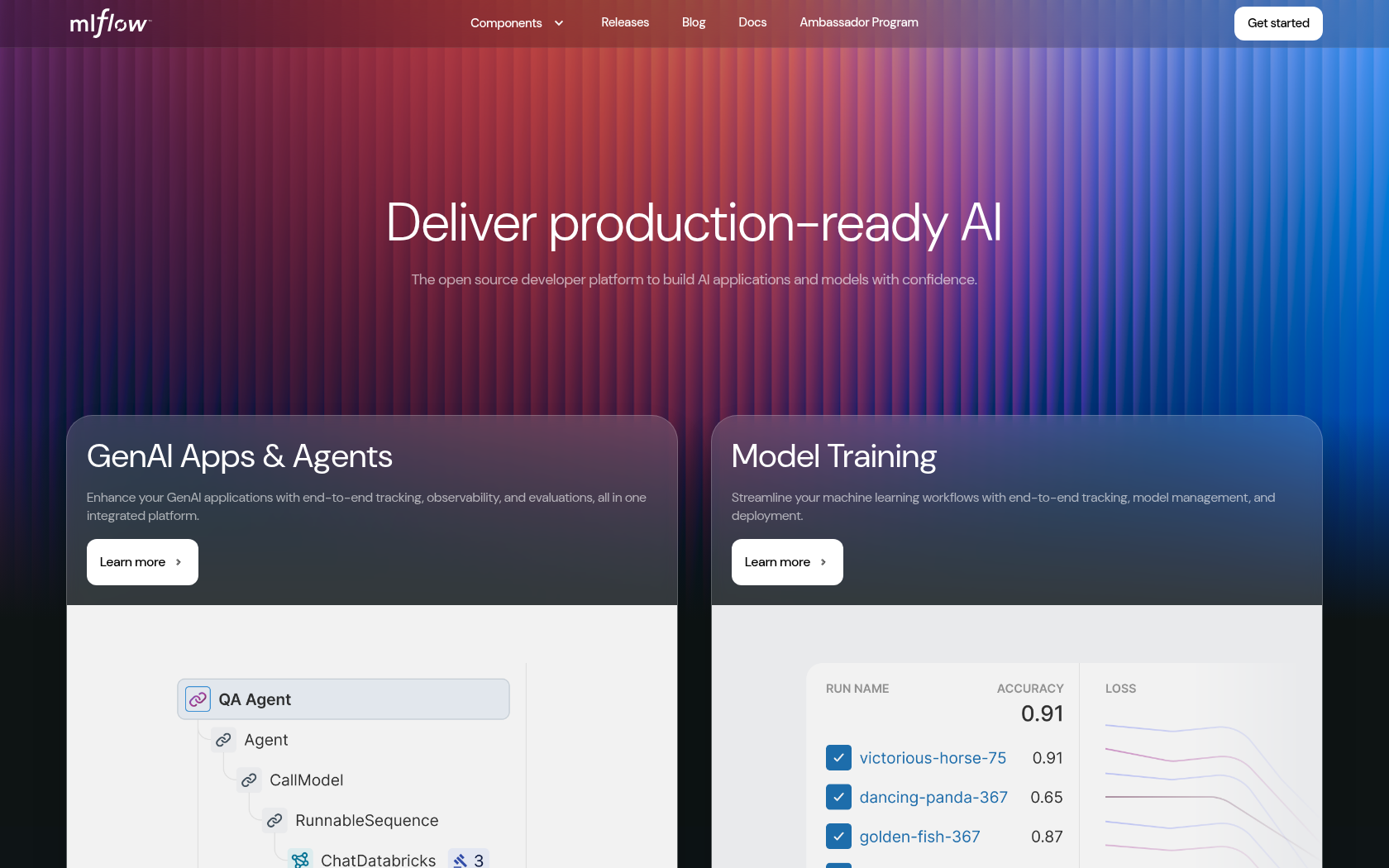MLflow
MLflow is an open source-based MLOps platform that unifies experiment tracking, model deployment, and project reproducibility.

- Launch Date
- June 2018
- Monthly Visitors
- 180.6K
- Country of Origin
- United States
- Platform
- Web
- Language
- English
Keywords
- ML experiment management
- model versioning
- ML deployment platforms
- how to use MLflow
- machine learning platforms
- MLOps tools
- ML tracking systems
- experiment reproducibility
- Pytochrome logging
- ML platform comparison
Platform Description
Core Features
-
Track and visualize experiments
Logging and comparing parameters, metrics, and artifacts per experiment
-
Model registration and versioning
Model registry feature enables name-based registration and version branching
-
Serving models
REST API-based model serving support and local/remote deployment integration
-
MLflow Projects
Define the execution environment and configure the format for automated execution
-
MLflow Models 포맷
Save different framework models in one standard format
-
Cloud integration support
Integration with MLOps environments such as AWS, Azure, Databricks, etc.
-
Support for local/on-premises installations
Open source foundation for installing and customizing internal servers
-
Automation scripts and CLI
Command-based task automation, easy for DevOps
Use Cases
- Compare model experiments
- Tuning hyperparameters
- Automate model deployment
- Validate model reproducibility
- Team-based ML collaboration
- Sharing dashboards
- Iterate on data-driven experiments
- Serving models
- Managing legacy models
- Experimenting with Git integration
- Python logging
- Cloud ML tracking
- Large-scale model versioning
- Building Enterprise MLOps
- Open source machine learning tools
How to Use
Run the default server
Start logging experiments via the API
Compare and analyze experiment results
Registering models in the Registry and serving them with the REST API
Plans
| Plan | Price | Key Features |
|---|---|---|
| Open Source MLflow | $0 | • Track experiments • Model registry • Run projects • Save and load models • Set up custom storage • Provide REST and Python APIs • Serve models locally • Free to deploy • No server costs, storage, or DB user fees |
| Databricks MLflow | $0.07-0.95/DBU | • Automatic experiment tracking • Advanced model registry • One-click model serving • Job scheduling and pipelining • Serverless cluster integration • Security and permissions management • Dashboard and analytics integration • Collaboration-based notebook environment |
FAQs
-
MLflow is an open-source platform for managing machine learning experiments and models. It helps you track, manage, and reproduce the experimental data, code versions, hyperparameters, model results, and deployments that happen when you create ML models in a single system. It makes ML projects more organized and collaborative for developers and data scientists.
-
There are four main components: - Tracking - to record parameters, metrics, result files, etc. for experiments - Projects - a structured way to reproduce code, environments, and dependencies - Models - to store and deploy models of different frameworks - Registry - to manage models as production/test versions and apply approval flows
-
MLflow itself is free. MLflow is an open-source machine learning operations tool that is free for anyone to use under the Apache 2.0 license. However, you will need to configure your own server, storage, DB, etc. and you will be responsible for the infrastructure costs.
-
MLflow is provided by Databricks, and while you can try it for free for 14 days, you have to pay for full use. Databricks integrates MLflow with a web UI, automatic experiment tracking, model serving, and more. You are billed on a per DBU (Databricks Unit) basis. You only pay for what you use, and there is a 14-day free trial.
-
No, you don't need to configure any DB or storage in Databricks. Databricks is a serverless environment that automatically manages the storage of experiment information, models, and artifacts. All you need to do is run ML experiments or record them in a notebook - all these infrastructure resources are included and billed in the DBU unit price.
-
Pay-per-use (DBU) billing: - CPU-based: approximately $0.15 to $0.40/DBU - Plans with advanced features: $0.55/DBU and above - GPU, model serving, SQL warehouse, etc. are separately priced - 14-day free trial, after which you must register a payment method to continue using.
-
MLflow is an open source platform that can be installed and used alone under the Apache 2.0 license. It can be freely deployed in local environments, cloud VMs, on-premises servers, and more. Databricks integrates and extends MLflow for enterprise environments.
-
No. MLflow's own API is free. There is no additional charge to use the REST API or Python API in the open source installations. However, in Databricks environments, computing resource usage for API calls may be reflected in the charges.
⚠ If any information is incorrect or incomplete, please let us know by clicking the button below. We will review and apply corrections promptly.




